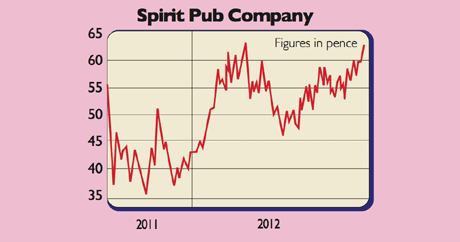
Heavily indebted pubs have created lots of misery for investors in recent years as shareholders in Punch Taverns (LSE: PUB) and Enterprise Inns (LSE: ETI) can confirm. During the go-go days of easy credit and roaring property markets, local boozers were loaded up with debt. With reliable cash coming in the door from regular drinkers and the debt secured against rising property values, the City saw the model as a win-win.
How times change. Punch is staring bankruptcy in the face, with Enterprise desperately trying to repay its huge debts. But Spirit Pub Company could be a phoenix set to rise from the ashes of this failed experiment in financial engineering.
Spun off from Punch 16 months ago, Spirit manages around 800 pubs under brand names such as Chef & Brewer, Fayre & Square and Taylor Walker. Around half are in London and the south of England, with a heavy bias towards families who want to eat out. This market continues to thrive, despite the tough economic climate. As a result, managed pubs (see definition below) are doing well, growing both sales and profits.
There’s a good chance that this will continue. Firstly, the business can become more efficient. New till systems and technology should improve stock control and staff productivity, boosting profit margins on a growing sales base. Spirit is also doing up its managed pubs.
Results from these refurbishments have been very promising, with sales up by 15% and a return on the money spent of more than 25%. With more pubs to be worked on, this is a good future source of growth.
Spirit Pub Company (LSE: SPRT)
The 500 leased pubs are less of a success story. These are still loaded up with debt and face tough trading. But the firm should be able to turn things around here too. It’s removed the strain on lots of its landlords by cutting rents. This has hit Spirit’s profits in the short term, but gives its landlords scope to invest and grow again.
Around 50 poorly performing pubs have already been sold, with more to follow. Some have fetched good prices and have helped reduce the pressure on Spirit’s balance sheet, which still has lots of debt. There’s potential for perhaps another 100 leased pubs to be converted to managed pubs. If they can do as well as the existing managed estate, there could be some decent profit upside here too.
During the last year, Spirit’s managed pubs made an average trading profit of nearly £92,000 per pub. The average for the leased pubs was just over £68,000. The managed pubs also have higher market values at around £1.3m per pub, compared with £0.5m for the leased ones.
Spirit is a risky investment, but it could pay off handsomely. Although it still has over £700m in net debt (debt less cash) and interest cover of less than two times, it doesn’t look in imminent danger of going bust. Profits are going up and debt should come down over time. It’s also a good sign that dividends are being paid to shareholders again. Trading on 9.6 times next year’s earnings with a dividend yield of 3.4%, the shares are worth a punt.
VERDICT: SPECULATIVE BUY AT 62p
What’s the difference between a managed and a leased pub?
Managed pubs are run directly by the pub company, which appoints the manager and staff. Lots of managed pubs are branded and have similar layouts and food menus. Leased or tenanted pubs are owned by the pub company, but run by landlords who pay rent to the pub company and usually buy their beer too. The pub is run independently, subject to a few guidelines from the pub company.